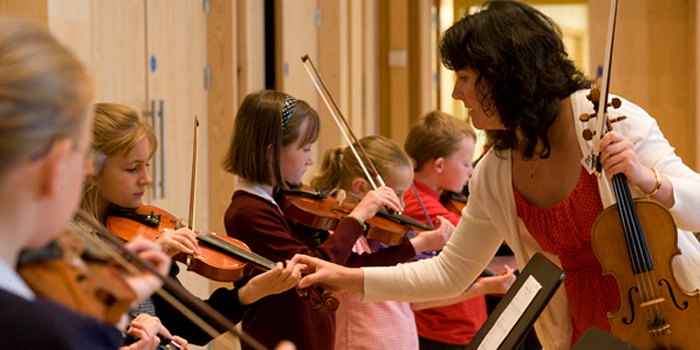SDSU Live Downtown
SAN DIEGO — As an artist and teacher, I’ve always been a passionate advocate of arts in education. I’ve seen from research and personal experience how the arts can really ignite sparks in the mind. Creative energy brings laughter and learning together, generating lifelong memories. An environment that encourages, and even demands, taking risks generates a level of courage and confidence that young people can take with them into any profession. Such fireworks were on display last Sunday afternoon wherein the students of SDSU took over Copley Symphony Hall for the second annual SDSU Live Downtown.
The moment we entered the lobby, we were treated to a lovely little pre-show by the SDSU Community Music School. (www.music.sdsu.edu) Children, teens and adults played together a variety of familiar pieces including “Kookaburra,” “Frère Jacques,” and “Shave and a Haircut.” A busy little girl was joyfully dancing along, transfixed on the performance. More impressive were their expressions of focused concentration. Music is largely about the art of listening, and couldn’t we all use more of that?
SDSU’s Wind Symphony got the ball rolling with a rousing “Star Spangled Banner” followed by the SDSU fight song, a funny contrast to the elegant, baroque décor. As they played an arrangement of themes from Broadway, students from the dance department busted some Martha Graham-style modern dance moves, working their way around the musicians. This was the one part of the show that was frankly lost on me and my guest. The costumes by Nhu Nguyen, gray tights with heavy boots, were rather odd and seemed to distract more than enhance.
Professionals from Westwind Brass (SDSU’s Brass Quintet in Residence) joined in for John Mackey’s “Fanfare for the Full Fathom Five,” an opus that rises and falls with the sweeping grandeur of the open sea. Maslanka’s “In Memoriam” plumbed the depths of a grieving soul whereas Respighi’s “Pines of Rome” swept us up to heights of spiritual ecstasy.
Act II showcased the SDSU Symphony Orchestra and was supposed to feature the Great Wall String Quartet. But there was an eleventh hour change to violin soloist Ayrton Pisco. And who was complaining? Nobody. The Brazilian born Pisco played with swag and the soulful spirit of a master klezmer. He had us eating out of his hand.
A great choir assembled for the Chichester Psalms. Leonard Bernstein was commissioned by Chichester Cathedral in Sussex, England for their 1965 music festival at a time when he was trying to define his musical voice. Was he the popular composer of West Side Story or the conductor of the New York Philharmonic? Ultimately, he was both.
Bernstein wrote four part harmonies common in Church music with a heavy influence of Jewish liturgical tradition keeping the words all in Hebrew. Hebrew words sung in a Christian choral tradition with an angelic falsetto solo, sung by Marc Kazmierowicz, was an implicit plea for peace in the rocky, nascent state of Israel.
The finale featured students from SDSU’s MFA in Musical Theatre program singing Bernstein’s “Make Our Garden Grow” from Candide. It’s an inspiring song of hope about building a house together and sharing a life that swelled our spirits to fullness and was answered with thunderous applause.
The Sages teach us that we are all to work toward Tikkun Olam, the reparation of a broken world. While our specific tasks differ greatly, it’s worth noting that 65% of the music teachers in San Diego schools are graduates of SDSU’s music program. And this begs a question: How much more whole would our world be if everyone had a chance to come together in a spirit of coöperation, listen to one another and elevate souls in acts of transcendent beauty?
Republished from San Diego Jewish World


























